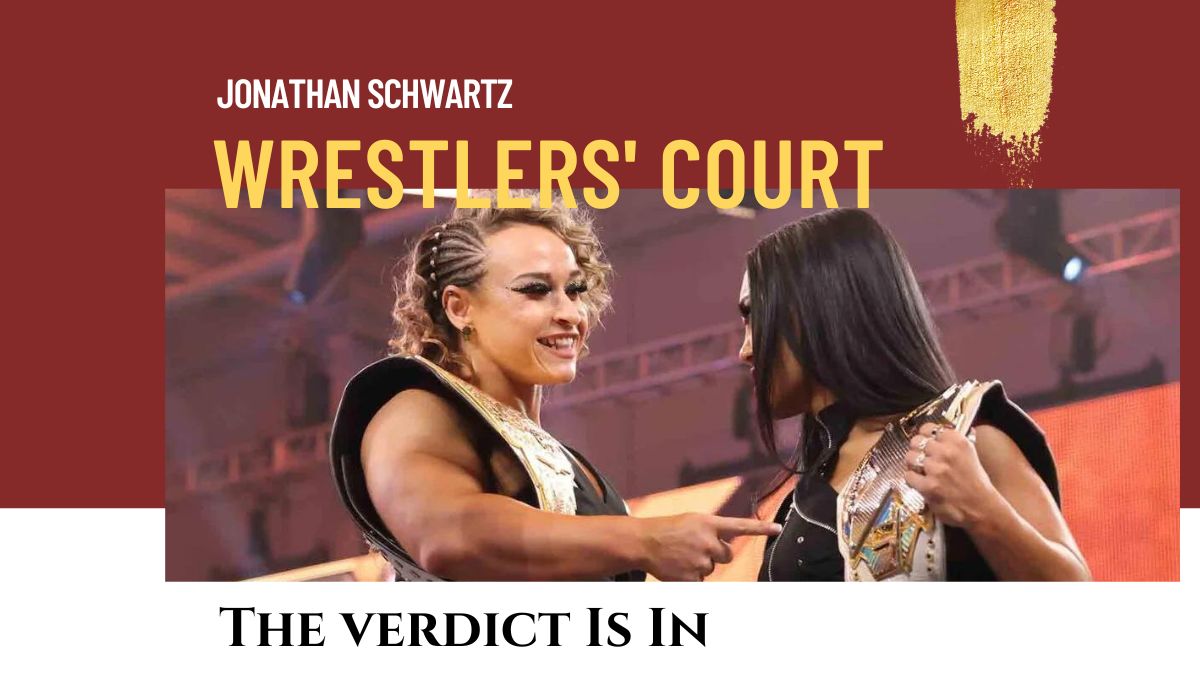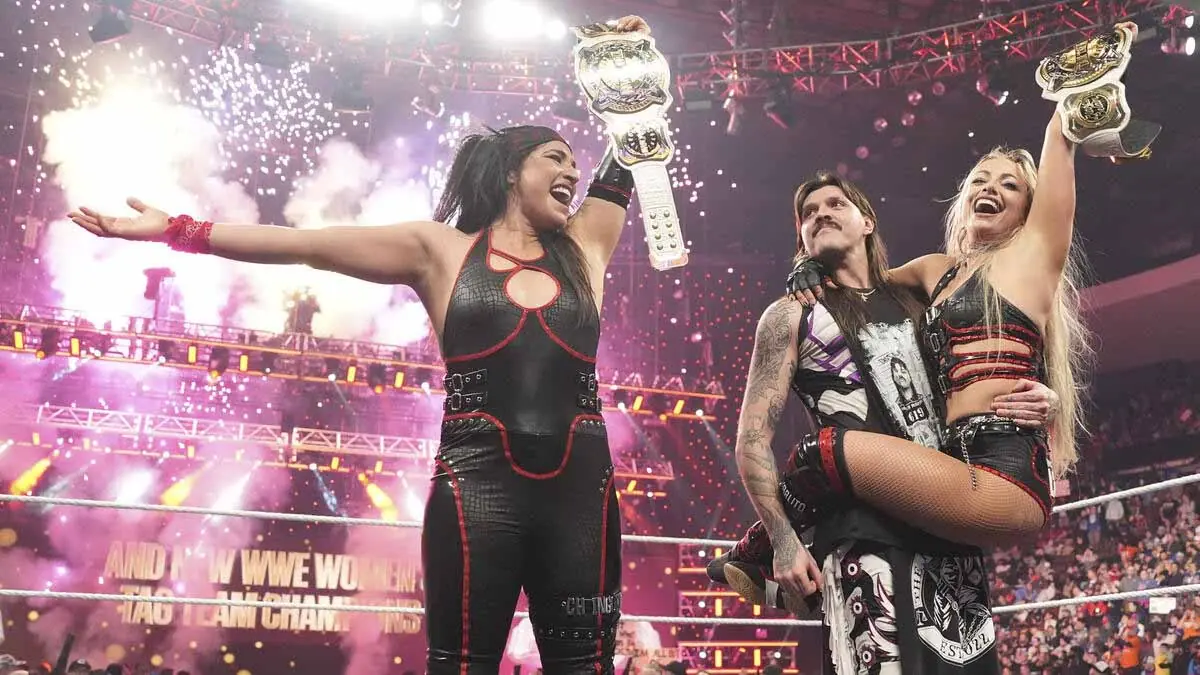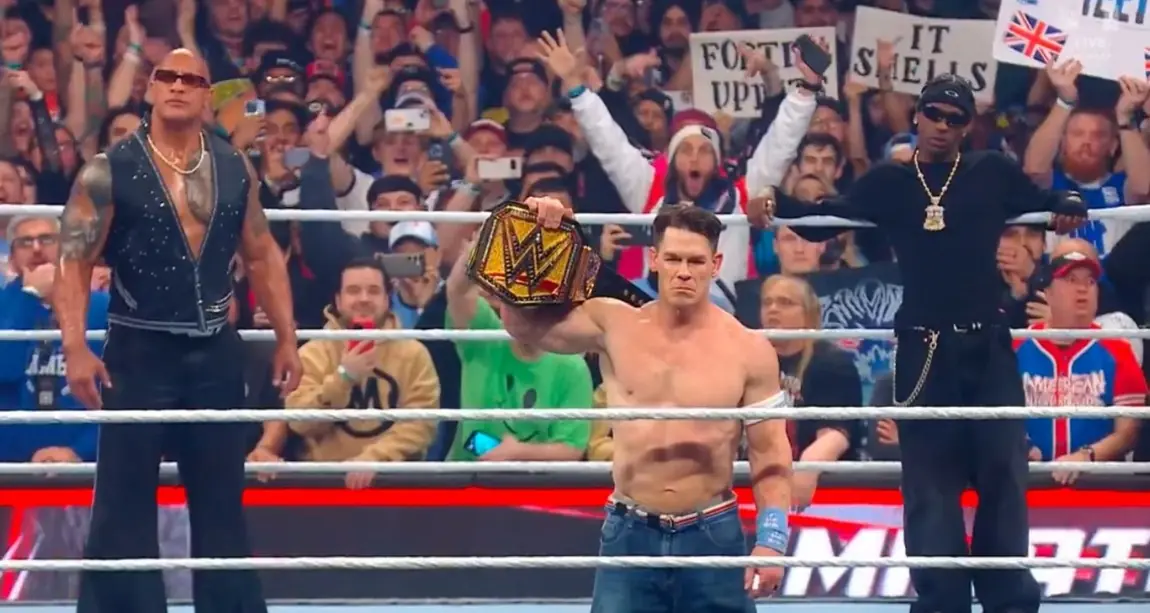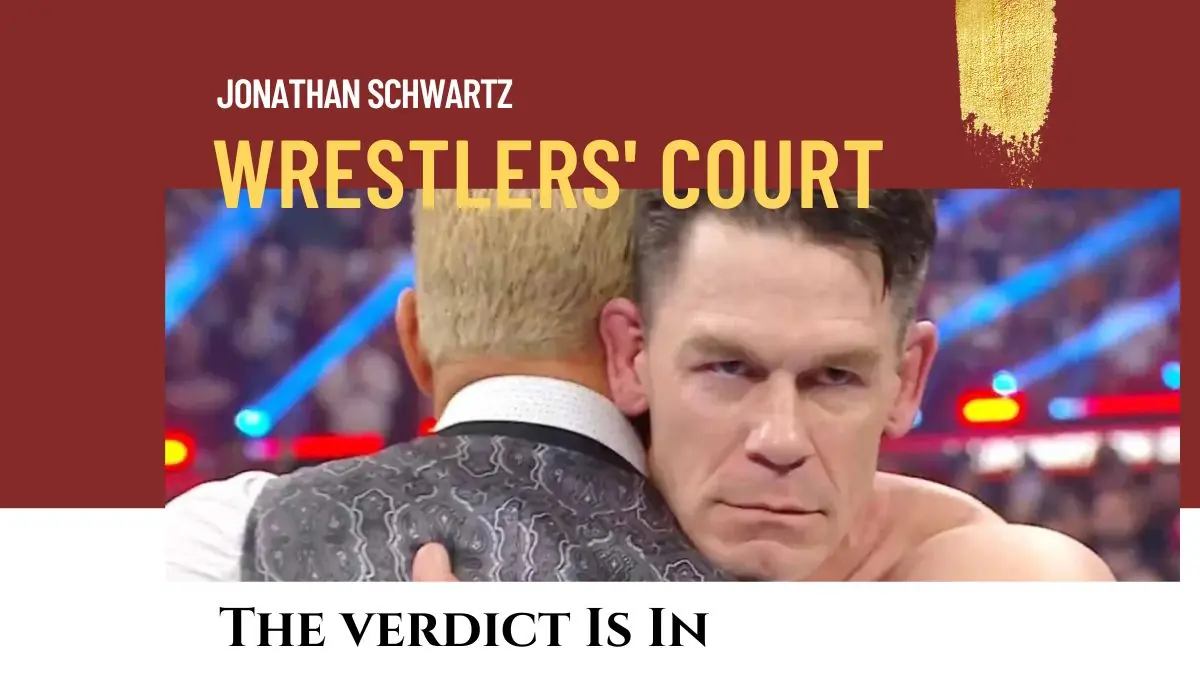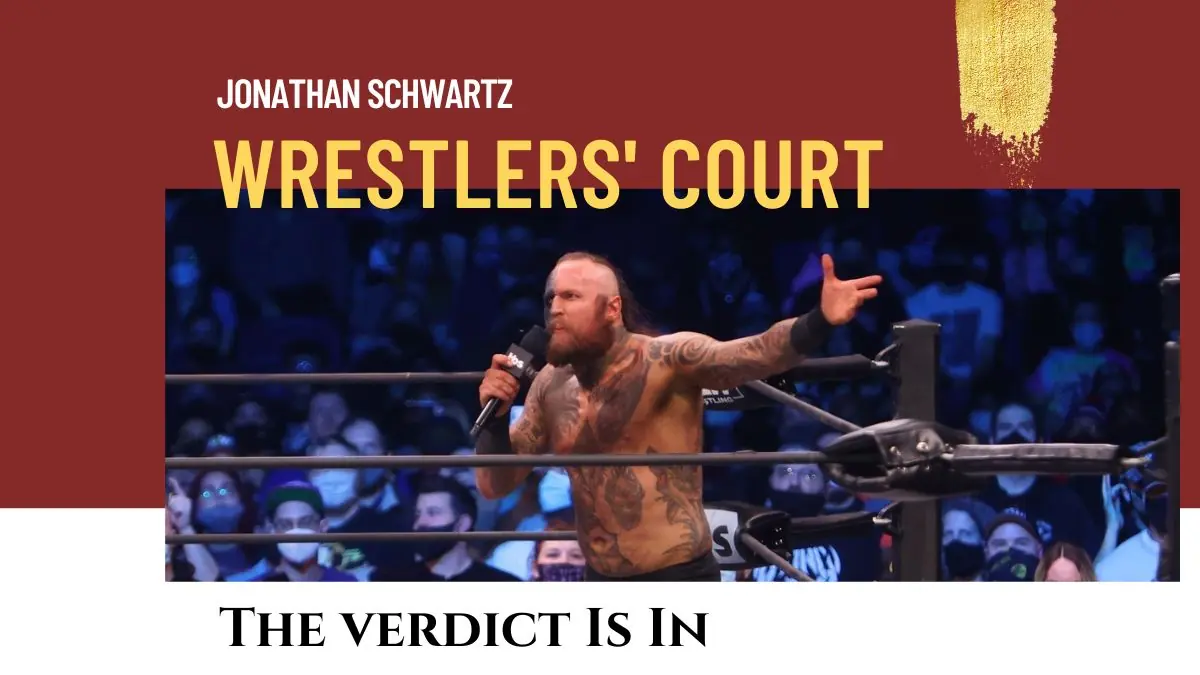Forgive me. While I’ll try to keep this column brief, I will bounce around between the three main US professional wrestling promotions: WWE, All Elite Wrestling (AEW) and TNA (and a bunch of others).
In recent memory WWE stood alone in wrestling fans’ consciousness. In 2002 TNA emerged as a solid though unprofitable second-place contender. Ring of Honor (ROH) started that same year as a distant third in name recognition but likely first in terms of match quality.
Within the past five years AEW has emerged as WWE’s biggest US competitor. It swallowed ROH — first by signing most of its talent, later buying the company outright.
In the past year WWE has emerged from its acquisition by TKO and Vince McMahon’s scandal-ridden departure, still the leading US pro wrestling brand. Fans seem more concerned about the future of AEW and TNA. I wouldn’t write any of these companies off … at least not for a while. I am concerned about an emerging trend towards these brands’ acknowledgement of and cooperation with each other. History shows this path often leads to the smallest promotion’s demise.
In a recent interview, AEW champion Swerve Strickland argued that on the heels of an apparent working agreement between WWE’s NXT brand and TNA, now would be a good time for WWE and AEW to pursue a similar arrangement. I disagree.
Inter-promotional cooperation isn’t new. It is rooted in the anti-competitive behavior of National Wrestling Alliance (NWA) members going back to the 1940s. Promotions sent talent from town to town, up and down the dial. Wrestlers were moved to gain more experience, to revitalize themselves in a new territory after running their course, or to become the next promoter’s problem. Travelling wrestlers’ histories were acknowledged to build their credibility before new audiences. Sometimes promoters lent cars full of of talent to bolster neighboring territories shows, especially when facing competition from a non-cartel member. Within the NWA these alliances were fragile as promoters constantly sought to guard or expand their turf.
WWE has shown it can ‘play nice’ with other promotions on occasion — always out of naked self-interest. These partnerships happen when WWE can take advantage of apparent rivals, only once said rivals are no longer perceived as threats. In 2024 that’s pretty much all of them.
In 1998, NWA officials and talent were briefly incorporated into WWE storylines. This was the rump of the organization left behind when Ted Turner seceded and rechristened Jim Crockett Promotions as World Championship Wrestling (WCW). WWE eventually bought out WCW and still couldn’t abide a ‘competitor’ in its midst. WWE also pursued a strategic behind the scenes arrangement with Paul Heyman’s Extreme Championship Wrestling which kept that promotion afloat in exchange for ECW acting as a conduit for ex-WCW talent to join WWE. WWE similarly propped up independent leagues like Jim Cornette’s Smokey Mountain Wrestling and Jerry Lawler’s USWA as they were dying, again as a means of accessing or holding rights to valuable talent. More recently EVOLVE Wrestling was founded in 2010 by former ROH booker Gabe Sapolsky. By 2015 EVOLVE had signed a working agreement with WWE, giving WWE a ‘first-look’ at EVOLVE talent and an opportunity to sign them (the Street Profits and Austin Theory being two examples). In 2020 WWE bought EVOLVE outright and shuttered it.

Before WWE took its developmental program in-house with the creation of NXT, it partnered with independent promotions like Memphis Championship Wrestling, Ohio Valley Wrestling, Deep South Wrestling, the Heartland Wrestling Association, Florida Championship Wrestling and Puerto Rico’s International Wrestling Association. The Ohio Valley partnership was probably the most successful; it lasted from 2000-2008 and its freshmen class of John Cena, Brock Lesnar, Batista and Randy Orton still pepper main events today.
These partnerships reflected the paucity of US wrestling outside WWE after it killed the territories, then its chief opponents in the Monday Night Wars. WWE faced an existential crisis. It needed to find a new way to develop ready-for-prime time talent. The resulting farm system (including NXT) has yielded mixed results. Current headliners like Cody Rhodes, Drew McIntyre, Damien Priest, CM Punk, Bobby Lashley, AJ Styles and LA Knight honed their skills in opposition promotions, often including TNA/Impact and ROH. Competitiveness lies at the heart of all business endeavors — a business exists to make money — but history shows that WWE needs effective competition to help build and maintain its roster. As big as WWE is, it cannot provide the varied education that wrestlers need to put on the best shows possible before the most diverse crowds.

Back to the present concern, WWE has mostly stuck to its usual playbook of denying TNA’s existence while raiding its roster. There have been exceptions.
In 2011 WWE announcers plugged Mick Foley’s latest book, Countdown to Lockdown: A Hardcore Journal on RAW. The book covered the acrimonious end of Foley’s run with WWE in 2008 and the beginning of his term with TNA.
In 2012 WWE and TNA worked out an odd deal that allowed TNA-contracted talent Ric Flair appear on WWE’s Hall of Fame broadcast for The Four Horsemen’s induction (Ole Anderson, Lex Luger and Paul Roma’s invitations must have been lost in the mail). In exchange, WWE offered to send any of its talent to cut a promo on TNA’s upcoming Slammiversary pay-per-view. TNA owner Dixie Carter opted for then-Intercontinental Champion Christian (Cage).

A decade later, then-TNA Knockouts Champion Mickie James became the promotion’s first active wrestler to compete in WWE’s Royal Rumble match — perhaps as a make-good for the disgusting way she was treated at the end of her WWE tenure.
Ever since James’ Rumble appearance, there have been rumors of further cooperation between WWE and TNA. These rumors came to fruition in 2024 when Jordynne Grace fought in this year’s Royal Rumble. While she was also quickly eliminated, she foreshadowed further involvement between the promotions in a post-match promo. In June 2024 Grace challenged NXT women’s champion Roxanne Perez for her title. Conversely, NXT wrestler Tatum Paxley showed up on TNA TV to challenge Grace and Brooks Jensen seems to be teasing his Nashville debut.
More recently, NXT held a ‘forbidden door’ style battle royal with a shot at its top championship on the line. Most of the ‘surprise’ entrants were preliminary wrestlers like Apollo Crews, Tyler Bate, Humberto Carrillo and Angel Garza. TNA’s Frankie Kazarian and Joe Hendry joined the fray.
If you watch TNA broadcasts now, they feel a lot like the dying promotions mentioned above: very good wrestling and fun storylines shot in a barebones set before miniscule audiences. At this point NXT’s involvement with TNA reads less as a partnership and more as charity, which is unfortunate. The first few weeks of the current NXT-TNA partnership make it clear that WWE is calling the shots: TNA is being booked into WWE’s semi-developmental brand, not flagships like RAW or SmackDown. TNA has sent main eventers to lose on NXT. Grace lost to Perez; Hendry received a huge ovation (and millions of social media hits, which may result in a longer-term storyline and eventual WWE contract) when he appeared in a battle royal for a NXT title shot, only to be immediately thrown out. Kazarian, a perennial mid-carder, had a Mr. Perfect Royal Rumble style run in the battle royal but was tossed as well.
I suspect that professional wrestling is headed into a period of consolidation. I’ve noted WWE’s willingness to lend out talent like Shinsuke Nakamura, Karl Anderson and Shayna Baszler to other promotions. AJ Styles is slated to wrestle for Pro Wrestling NOAH. Kairi Sane is going to do a show with Marigold. WWE has made no secret of its interest in international expansion. At one point this meant broadening NXT’s reach into markets like the UK (which did happen, for a while), Europe, Japan, Mexico and India. These plans were mostly mothballed by the COVID-19 pandemic. More recently WWE officials have spoken with Pro Wrestling NOAH and are said to have opened up talks with Puerto Rican and Mexican promotions.
We shall see whether WWE has evolved to a point where it can leverage these partnerships or the talent it brings in effectively.

In 2020 AEW partnered with TNA. The affair began when Kenny Omega defeated Jon Moxley for the AEW World Championship at Winter is Coming. Omega turned heel and won the title thanks to help from Don Callis, who had been featured as Omega’s lifelong friend and mentor (and coincidentally a TNA exec). Omega’s victory established him as a travelling, belt-collecting heel, as Omega was already the AAA Mega Champion as well. After his win, Omega fled the building with Callis, vowing to take his title to TNA. Omega fought then-Impact World Champion Rich Swann in a title-for-title match. Omega won and defended the Impact championship against stars like Moose and Sami Callahan. Omega lost the Impact championship to fellow AEW star Christian Cage, who in turn put over Josh Alexander, ending the partnership and returning Impact’s main title to its own roster. AEW continues to leverage partnerships with international wrestling companies like New Japan Pro Wrestling (NJPW) or Consejo Mundial de Lucha Libre (CMLL) although I think these have done AEW more harm than good.
A few years ago I thought that AEW’s inter-promotional work with Impact portended the sale of the latter to the former — or at least an ECW style arrangement where Tony Khan paid Anthem to keep Impact’s lights on.
I was wrong. Instead, AEW bought ROH’s distressed assets from Sinclair Broadcasting Group.
Without an ROH presence on television, a distinct roster or consistent attention from management ROH has become mostly irrelevant.
I thought AEW’s acquisition of ROH was a mistake from the beginning, given history’s dim view of wrestling promoters who try to operate multiple bands. My fears have borne out. Today ROH exists almost exclusively online, with episodes taped around AEW’s schedule. Most of the roster is invisible — apart from some of the brand’s champions, who turn up on hastily booked pay-per-views or in supporting roles on AEW broadcasts. The ROH six-man title has effectively been merged with AEW’s trios belts and mostly ignored. Pure Champion Wheeler Yuta recently returned to action with belt in tow after months off due to injury. I don’t think many remembered he was champion. Women’s titlist Athena Palmer is now injured and expected to be out for half a year; she has held that belt for almost two years, which is news to me. ROH World Champion Mark Briscoe won a four-man match for a shot at a tertiary AEW belt. Briscoe won the ROH belt from Eddie Kingston, who had earlier unified it with the NJPW Strong championship and a quaternary AEW belt — which shows you how valuable the ROH title is in Tony Khan’s eyes.

AEW must either find a way to run ROH as a separate entity from AEW or my preference would be for them to hold a invitational tournament to crown an all-time Grand Champion. They certainly have enough former champs on the roster to make a barn burner: Bryan Danielson, Jay Lethal, Chris Jericho, Claudio Castagnoli, Mark Briscoe, Eddie Kingston if healthy, Christopher Daniels, Samoa Joe plus Dalton Castle, Adam Cole, Kyle O’Reilly, Roderick Strong and Matt Taven for starters; then maybe sign a few guys for tourney purposes like Eddie Edwards and Austin Aries. At the end, retire the brand except for special pay-per-view attractions. Right now it’s a distraction.
Despite the weight of precedent I’m hopeful when it comes to TNA and NXT. Because the stakes are lower NXT might be a great place for cross-pollination. I’m particularly intrigued by the recent signing of Ethan Page, one of many sadly underused talents in AEW. An NXT-TNA alliance might bring him closer to reforming his tag team (or working a program) with Josh Alexander, who has become a fantastic worker and solid promo on his own. Let’s throw Shawn Spears in for fun … and maybe Eric Young if he’ll consider working for a post-McMahon WWE and you could have the beginnings of a new Team Canada.
I hear Team Canada’s manager, Scott D’Amore, might be available soon, too.
TOP PHOTO: Jordynne Grace challenges Roxanne Perez. WWE photo
RELATED LINKS
